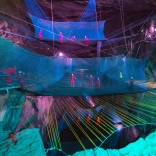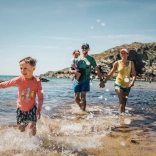There are 10 standards of practice that have been developed to:
- support providers in their delivery of safe and effective practice
- support providers in meeting the expectations of Visit Wales for sustainable adventure activity tourism, and the adventure activity/outdoor recreation sector ‘good practice’ requirements
- promote and assure quality of practice
- support providers in assuring and demonstrating the standard of ‘customer care’
- support providers and those who purchase services or use outdoor practitioners, to evaluate the standard of adventure activity tourism and outdoor recreation provision
The 10 required standards of practice are:
1. Autonomy and accountability - competence of instructional staff
- Providers deploy instructional staff to practice within the scope of their competencies
- Providers deploying instructional staff demonstrate the behaviours, skills and knowledge to fulfil the responsibilities of their role
- Providers fulfil their duty of care to all involved
- Providers demonstrate professionalism at all times
2. Delivering a safe and effective service
- Where new roles are taken on, an appropriate planned orientation and induction programme is undertaken
- Staffing and skill set is sufficient to support the services being provided
- Operational procedures should be consistent with nationally recognised standards for each of the activities provided
- Services are delivered in a risk-managed environment and offer a systematic, proactive and responsive approach to risk management (including lone workers) following the provider’s overall strategy
- There is a systematic, proactive and responsive approach to emergency situations that follows the provider’s Emergency Action Plan
3. Learning and development
- Providers actively engage with and reflect on the Continuing Professional Development (CPD) process to maintain and develop their staff currency of competence to practice
- Providers offer quality CPD opportunities that help others learn and develop
- Providers actively engage with supporting apprentices, trainees etc. and the development of their professional socialisation.
- There are recognised structures, processes and resources in place that support learning and development in the workplace and enable providers and their staff to meet the requirements of their role and meet professional and regulatory CPD Requirements
4. Working in partnership
- Services are designed, planned and delivered with the aim of promoting and improving tourism and recreation, environmental awareness, safety management, health and well being, as well as educating and developing all
- Customers/clients are respected as individuals and placed at the centre of their own learning and development, thus empowering users to participate in their own development
- Collaboration within and between service providers is established to enable ‘good practice’ models to be maintained
- Work with the respective regional Charter Groups (SWOAPG, POCG and S-A /NWEOCG) to ensure environmental ‘good practice' models are maintained
5. Consent
- Providers obtain and document the customer’s/client’s informed consent before activity delivery
- In consenting, the customer/client is fully aware of what they are consenting to i.e. understand the type and level of activity to be undertaken and the levels of associated risk
- Where a customer/client is under the age of consent, such consent must be obtained and documented via a third party i.e. parent or guardian
6. Record keeping and information governance
- Records are stored whilst current and disposed of in accordance with legal requirements
- Data capture systems are designed and maintained to provide effective security
- Providers can evidence periodic audits of records, in respect of operational procedures, risk management and equipment etc., demonstrating governance currency and that equipment is/remains ‘fit for purpose’
7. Communication
- Mechanisms exist to ensure effective communication within and outside of the provider’s business
- Providers communicate effectively with customers/clients to ensure effective and efficient services
- Providers communicate effectively with other outdoor professionals and relevant outside agencies to ensure effective and efficient services
- Providers treat all information in the strictest confidence
8. Management and provision
- There is fair and equitable access to services
- Providers will take heed of the advice and/or guidance of relevant National Governing Bodies (NGBs), Awarding Bodies (ABs) and National/Regional Charters, as well as adhere to ‘good practice’ in all aspects of the business, including safety and quality
- Providers display evidence that the management of safety is effectively advised by, one or more competent (Technical Advisor) person(s) with sufficient knowledge of safety matters in relation to the facilities for adventure activities delivered by the provider
- The ‘Technical Advisor’ is to have the appropriate expertise and be competent to give advice
9. Evaluation of services
- Effective quality improvement processes are in place, which are integrated into the existing structure
- There is an audit programme to ensure continuous improvement of quality
- There is a clear and responsive procedure for making and dealing with complaints
10. Promotion and marketing adventure activity tourism and outdoor recreation sector services
- Information provided on services and products accurately reflects those offered by the provider
- Services sold or supplied to customers/clients are necessary
- The endorsement of a product or service is based on sound reasoning, evidence and consideration of cost and quality



